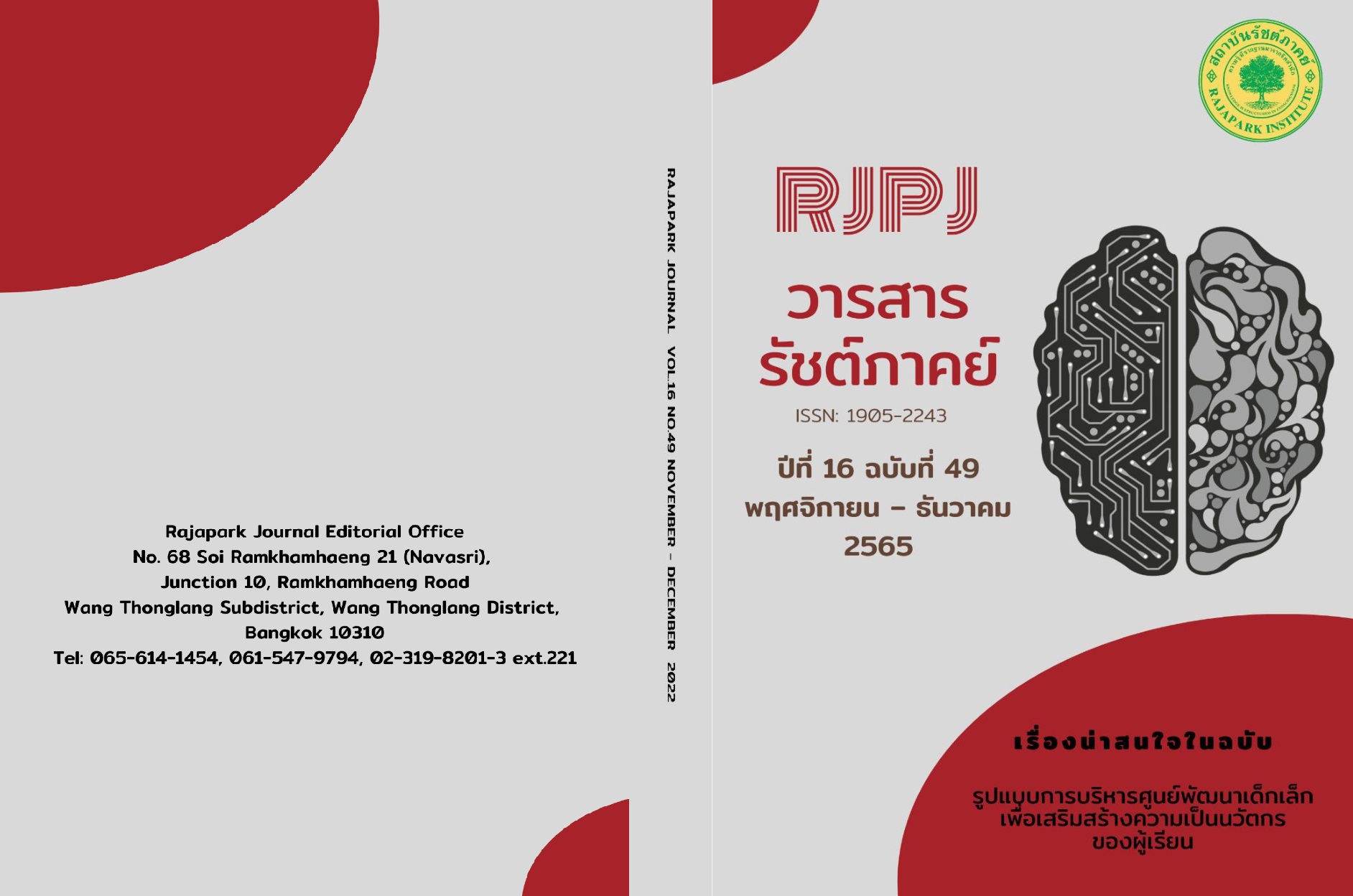The Development of Academic Administration Model to Support the Desirable Characteristic of Nursing Students in the 21st Century Praboromarajchanok Institute
Main Article Content
Abstract
This research aimed at developing and evaluating an academic administration model to enhance desirable characteristics of nursing students in the 21st century at the Praboromarajchanok Institute. The research applied a mixed-methods design composed of three steps: 1) exploring the condition of academic administration to enhance desirable characteristics of nursing students in the 21st century. The sample consisted of 175 academic administrators. The data were analyzed using means and standard deviations. The guidelines of academic administration to enhance desirable characteristics of nursing students in the 21st century were explored among 10 academic administrators, and data were analyzed using a content analysis. 2) Constructing and validating the model using the data obtained in step one and validating the model by nine expert panels. 3) Evaluating the model among 123 academic administrators. The research found that the model of academic administration to enhance desirable characteristics of nursing students in the 21st century consisted of six components: 1) the context of academic administration, principles, objectives, and success factors of the model; 2) input factors; 3) processes; 4) outputs; 5) outcomes; and 6) feedbacks. The expert opinions indicated that the model was appropriate. The academic administrators agreed that the feasibility of the model was high and its usefulness was at the highest level. Therefore, the model should be disseminated for further implementation in academic administration to enhance the desirable characteristics of nursing graduates in the 21st century.
Article Details

This work is licensed under a Creative Commons Attribution-NonCommercial-NoDerivatives 4.0 International License.
Views and opinions appearing in the Journal it is the responsibility of the author of the article, and does not constitute the view and responsibility of the editorial team.
References
Chaiwong, N., Sri-Ngan, K., & Vajarintarangoon, K. (2021). The Model of Academic Administration of the Faculty of Nursing Rajabhat University, Journal of MCU Peace Studies, 9(4),1383-1395.
Chamchoi, S. (2018). School Administration in the Digital Era. Chulalongkorn University.
Chantra, R., & Sarakshetrin, A. (2017). Learning Skills in 21st Century of Nursing Students at Boromarajonani College of Nursing Suratthani. The Southern College Network Journal of Nursing and Public Health, 4(1). 180-190.
Chiangkul, W. (2016). The State of Thai Education in the year 2014/2015: How to Reform Thai Education to Keep up with the World in the 21st Century. Office of the Education Council Secretariat.
Eisner, E. W. (1976). Educational Connoisseurship and Criticism: Their form and Functions in Educational Evaluation. Journal of Anesthetic Educational, 10(3/4), 135-150.
Fridee, R. (2016). Developing Works by Using Peer Feedback. PULINET Journal, 4(2),174-181.
https://pulinet.oas.psu.ac.th/index.php/journal/article/viewFile/211/210
Kanthong, S., Tuntirojnawong, S., & Vijitwanna, S. (2016). Development of Administration Model for Higher Education Institutions Founded on the Amalgamation of Princess of Naradhiwas University. Princess of Naradhiwas University Journal, 8(1),126-139.
https://li01.tci-thaijo.org/index.php/pnujr/article/view/52664
Krejcie, R.V., & Morgan, D.W. (1970). Determining Sample Size for Research Activities. Educational and Psychological Measurement, 30(3), 607-610.
Office of the Higher Education Commission. (2014). Higher Education Internal Quality Assurance Manual 2014. Parbpim.
Phramsiri, R., Pimsarn, N., & Chumworathayee, N. (2016). Model of Academic Administration in Private University for Excellence. Journal of Industrial Eduaction,10(2),106-116.
Prombuasri, P., Malai, C., Chaiyoyingyong, R., & Kitnopkiat, K. (2017). The Development of Quality Management Model Enhancing Educational Quality among Nursing Colleges under the Jurisdiction of Praboromarajchanok Institute Ministry of Public Health. Journal of Nursing and Education, 10(1), 44-63.
Sanguannam, C. (2008). Theory and Practice in School Administration (2nd ed.). Bookpoint.
Sinlarat, P. (2019). Principles of Curriculum and Teaching Management (5th ed.). Chulalongkorn University.
Suthipong, R. (2014). Model of Risk Management in Sports and Recreation in Demonstration Schools under the Higher Education Commission[Doctoral dissertation, Naresuan University].
Tangkunanan, P. (2019). Academic Administration in School for Sustainable Development. Mean Service Supply.
The National Advisory Council on Nurses Education and Practice. (2010). Addressing New Challenges Facing Nursing Education: Solutions for a Transforming Healthcare Environment. Eight Annual Report.
Trilling, B., & Fadel, C. (2009). 21st Century Skills: Learning for Life in Our Times. John Wiley & Sons.
Turale, S. (2011). Preparing Nurses for the 21st Century: Reflecting on Nursing Shortages and Other Challenges in Practical and Education. Nursing and Health Science, 13, 229-231. DOI: 10.1111/j.1442-2018.2011.00638.x
Turner, K., Leungratanamart, L., Reunreang, T., & Rakkwamsuk, T. (2018). Development of a Pedagogical Model to Promote 21st Century Skills of Nursing Students. Nursing Journal of Ministry of Public Health, 28(1), 127-138.
https://he02.tci-thaijo.org/index.php/tnaph/article/view/121758
Wannasri, C. (2014). Academic Administration in Educational Institutions. Rattanasuwan.


